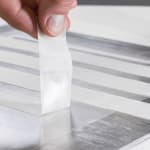
At the Compamed 2025 medical technology trade show, Wacker will present a selection of silicone materials for medical and therapeutic applications, including its first biomethanol-based silicone gel, Silpuran eco 2114. The adhesive is designed for skin-friendly fixation of wound dressings, plasters, wearables and sensors. The company will also share new findings on silicone gel adhesives for transdermal patches from its Healthcare Competence Center in Ann Arbor, where release behavior was analyzed using a Franz diffusion cell. In addition, visitors can see silicone elastomers Elastosil R plus 4360 and Elastosil R plus 4366, solid rubber grades developed for profiles, support parts and pharmaceutical tubing. Compamed 2025 will take place in Düsseldorf, Germany, from November 17 to 20. In Silpuran eco 2114, fossil methanol is replaced with biogenic methanol via a mass balance approach certified under the REDcert2 scheme, which preserves fossil resources and is climate-friendly. Considering the global warming potential of related emissions, the eco variant enables up to 28 percent carbon dioxide savings versus the conventional grade, while maintaining identical specifications, processing behavior and performance. The two-component, addition-curing adhesive cures to a soft gel with high adhesive strength that can be removed gently and without residue, making it suitable for sensitive skin and chronic wound care. The material has medium viscosity and high transparency and targets wound dressings, plasters, wearables, sensors and transdermal systems. For tubing and pump applications, Wacker will feature two addition-curing silicone rubbers that avoid peroxide-derived cleavage products during vulcanization, supporting purity and process reliability in medical and pharmaceutical environments.
Biomethanol-based silicone gel for skin adhesives
Silpuran eco 2114 is Wacker’s first silicone gel for medical skin applications produced with biomethanol using a mass balance method certified by REDcert2. The approach substitutes biogenic methanol for fossil methanol in the upstream production chain, conserving fossil resources and lowering the associated carbon footprint. When the global warming potential of process emissions is considered, the eco grade achieves up to 28 percent carbon dioxide savings compared with its conventional counterpart.
According to Wacker, there are no differences in chemical composition, quality, specifications or processing. The eco product is intended as a drop-in option for existing processes. "Our customers simply keep using the same formulation they’ve always used. Product quality and performance remain the same," says Ian Moore, head of the Consumer and Health Business Unit at Wacker Silicones. "The two variants are chemically identical. The key difference only lies in the associated carbon footprint which is significantly lower in the eco product."
The two-component, addition-curing adhesive forms a soft, skin-compatible gel with high adhesive strength. It can be removed painlessly and without residue, which is relevant for sensitive skin and the treatment of chronic wounds. The gel exhibits medium viscosity and high transparency, addressing wound dressings and plasters, wearables, sensors and transdermal systems.

Silpuran medical adhesives
Research on silicone adhesives for transdermal systems
At Compamed, Wacker will present results from its Healthcare Competence Center in Ann Arbor on silicone gel adhesives used as matrices in transdermal patches. The team evaluated the efficiency of release from silicone layers up to 300 micrometers thick using a Franz diffusion cell. The actives examined included over-the-counter therapeutics such as ibuprofen, anti-inflammatory drugs and herbal remedies, as well as common wellness ingredients, various vitamins and dietary supplements. Above-average release rates were identified for more than 20 active ingredients.
Wacker reports that release profiles can be tailored with silicone gel adhesives. "We were also able to show that silicone gel adhesives can be used to develop customized release profiles," says team leader Dr. Ufuk Karabiyik. These profiles include constant, steady release, an initial burst or a delayed onset. "Our research shows that silicones are much more than just carrier materials. They will form the basis for the next generation of transdermal systems that are gentle on the skin, can be dosed with precision and are highly versatile in use", Ufuk Karabiyik adds.
Silicone grades for pharmaceutical tubing
Wacker will display two addition-curing solid silicone rubbers for hoses in peristaltic pump service, Elastosil R plus 4360/60 and Elastosil R plus 4366/60. Vulcanization of these grades does not generate peroxide-containing cleavage products, supporting high purity and process reliability. Typical applications include heart-lung machines, dialysis and respiratory equipment, infusion systems and catheters. The materials are also suitable for dispensing drugs and mRNA vaccines.
Elastosil R plus 4360 is characterized by high rebound resilience and a low compression set. Elastosil R plus 4366 additionally features a low-friction surface, with a surface friction coefficient up to 70 percent lower than comparable standard grades. As a result, hoses made from these grades are well suited for peristaltic pumps, where tests indicate a greatly increased service life and pumping accuracy. Both products comply with FDA and BfR requirements and are generally suitable for the manufacture of food contact products.
Exhibition details
Wacker will exhibit at Compamed 2025 in Hall 8A, Booth G04.

Elastosil 4366



